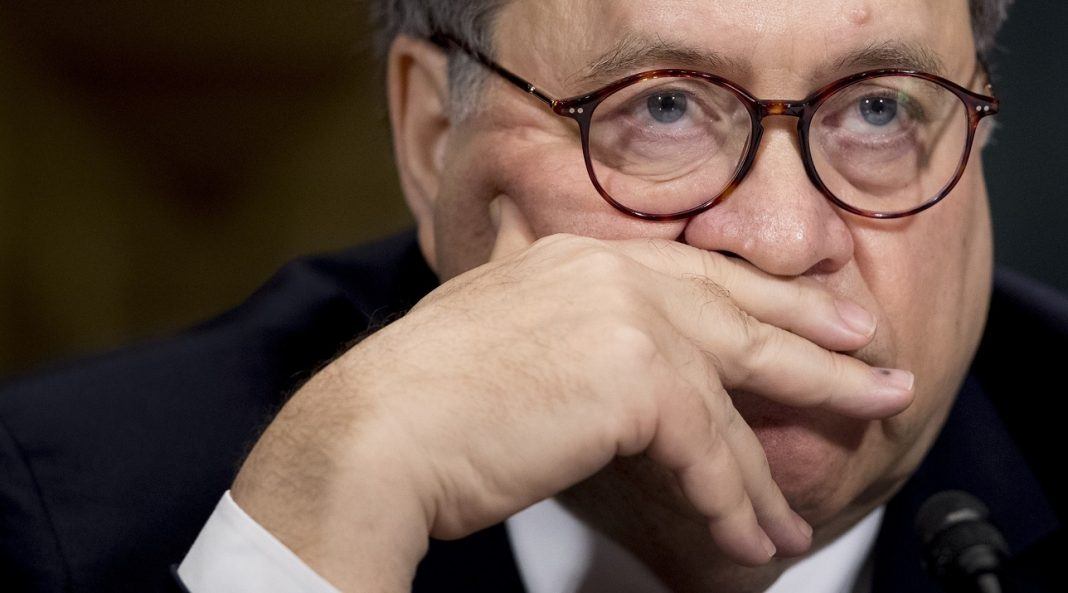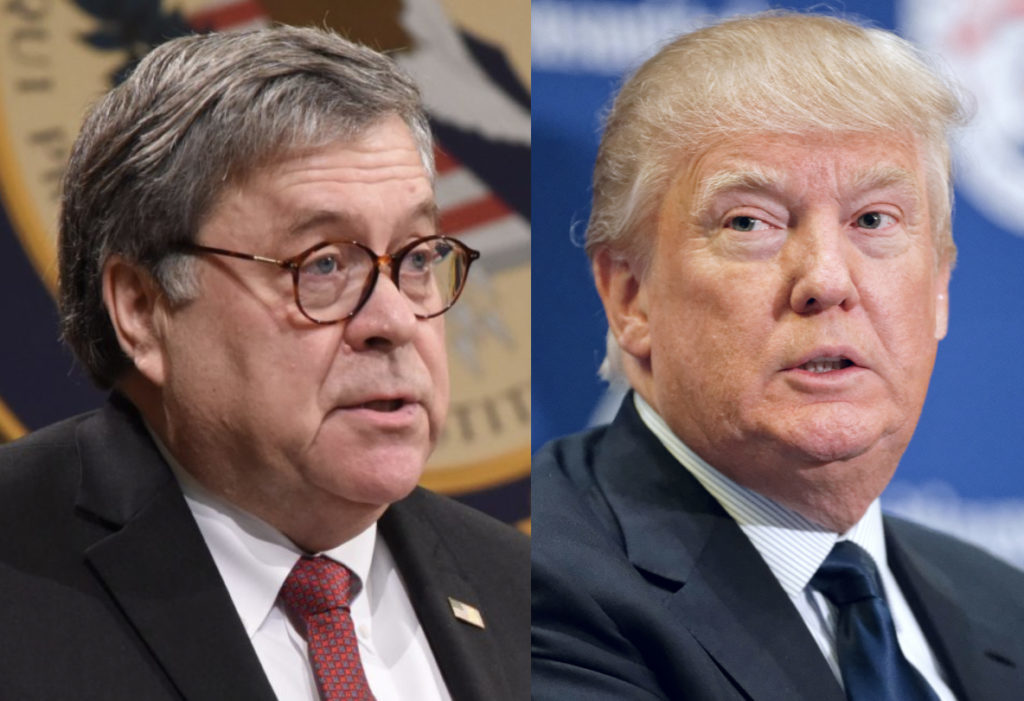
Donald Trump couldn’t have ordered up a better U.S. Attorney General model than William Barr. Not for America, of course, just himself.
He’s not the blustery style of people the president likes to surround himself with, which makes him all the more ideal. He’s methodical, goes along with Trump’s every whim and knows how to push the law to the extreme.
Anyone who took a civics class (yes, they used to exist in American schools) knows that the Attorney General works for the citizens of America (we are paying his salary), but Barr can’t stop slipping into being an advocate for only one person. He adopted Trump’s “collusion” and “spy” verbiage while continually letting the Senate know that the president was in the clear, case closed.
Attorney General William Barr is sparring with congressional Democrats, defending Trump’s efforts to shut down the Russia probe and painting a sanitized picture of the president’s conduct in special counsel Robert Mueller’s report.
The performance received a warm Twitter reception from Trump, who has not been shy about wanting loyalty in his attorney general.
A look at Barr’s rhetoric on the Russia investigation.
DEFENDING DONALD TRUMP
Barr has been a fierce advocate for Trump on the question of obstruction.
In explaining his decision that Trump didn’t commit a crime, Barr said he was swayed by how the president was “falsely accused” in the Russia investigation. According to Barr, Trump couldn’t have obstructed justice because he wasn’t concealing an underlying crime.
During testimony Wednesday before the Senate Judiciary Committee, Barr said the president could have legally ended the Russia probe at any time.
“If it was a groundless proceeding, if it was based on false allegations, the president does not have to sit there, constitutionally, and allow it run its course,” Barr said. “The president could terminate that proceeding.”
Barr also gave Trump an out on publicly threatening his former aides not to “flip.”
Citing what he believed “the president’s lawyers would say,” Barr said what Trump meant by “flipping” is “succumbing to pressure on unrelated cases to lie” in exchange for leniency.
Discouraging in “that sense is not obstruction, he said.
CRITIQUING ROBERT MUELLER
At his confirmation hearing, Barr spoke about his closeness with Mueller, praised him as “straight shooter” and said the Barrs and the Muellers are “good friends” and would be when “all this is over.” But since taking over the Justice Department, that relationship appears to have frayed.
Referring to a letter Mueller sent him complaining about his handling of the Russia report, Barr called it “snitty.” The special counsel’s work ended upon submission of the report, he said.
“At that point, it was my baby,” Barr said, adding: “It was my decision how and when to make it public, not Bob Mueller’s.”
Barr also expressed frustration that Mueller chose to lay out evidence on both sides on the question of obstruction, rather than making a clean decision.
“I think that if he felt that he shouldn’t go down the path of making a traditional prosecutorial decision then he shouldn’t have investigated,” Barr said. “That was the time to pull up.”
PRAISING A ‘FULLY’ COOPERATIVE WHITE HOUSE
It’s true the White House allowed Mueller to interview dozens of officials, including White House counsel Don McGahn. The campaign also turned over 1.4 million pages of documents. In announcing the Mueller report, Barr went even further, saying Trump took “no act” that “deprived the special counsel of the documents and witnesses necessary to complete his investigation.” On Wednesday, Barr told lawmakers he believes Trump “fully cooperated.”
But Barr left out that Trump refused to sit for an interview and instead provided written responses, many of which involved the president saying he couldn’t recall specific details. Pressed by lawmakers about the lack of a presidential interview, Barr placed the blame on Mueller, not Trump.
The special counsel’s team found Trump’s written answers lacking, but Barr quipped of Mueller: “Well, he never pushed it.”
NOT THE LYING POLICE
Mueller’s report lays out several instances in which people around the president refused to carry out his orders because they felt they weren’t right or would require them to lie. One such instance occurred with McGahn.
In January 2018, the New York Times reported that Trump had directed McGahn to have Mueller fired, and McGahn had threatened to resign rather than carry out the order. After the story was published, Trump repeatedly directed McGahn to deny it, but McGahn said it was largely accurate. Trump had indeed ordered him to call the Justice Department and try to have Mueller removed, McGahn said, though he noted that some of the details in the story weren’t right.
According to Mueller’s report, Trump argued that he had just asked McGahn to raise the issue of whether Mueller had a conflict of interest with Deputy Attorney General Rod Rosenstein and leave it to him to decide. But McGahn said that wasn’t what happened, an account he backed up with contemporaneous notes.
Under questioning about the president’s conduct, Barr said he didn’t think it amounted to obstruction because Trump “truly felt” the Times story was inaccurate. And he said trying to get a lawyer to change his story to avoid public criticism isn’t a crime.
“I am not in the business of determining when lies are told to the American people,” Barr said. “I am in the business of determining whether a crime has been committed.”
NO COLLUSION, NO COLLUSION
When he released the Mueller report, Barr stressed several times that the special counsel found no criminal conspiracy between the Trump campaign and Russia. On Wednesday, Barr noted that as Trump “said from the beginning, there was in fact no collusion.”
The comments went beyond Mueller’s careful language.
Mueller wrote that he “did not establish” a criminal conspiracy between the campaign and the Russian government but found that the “campaign expected it would benefit electorally from information stolen and released through Russian efforts.” The report also contained a caveat.
“A statement that the investigation did not establish particular facts does not mean there was no evidence of those facts,” Mueller wrote.
Fact vs Trump Barr Fictions
President Donald Trump and his team are still twisting the findings of the special counsel’s report on the Russia investigation.
At a Senate hearing Wednesday, Attorney General William Barr echoed Trump’s refrain of “no collusion” between the Trump campaign and Russia, insisting that any and all allegations of collusion have been “proven false.” That’s not the case.
Senate Judiciary Committee Chairman Lindsey Graham also got it wrong when he asserted that special counsel Robert Mueller had asked Barr to make a ruling on whether Trump obstructed justice.
Collusion, Obstruction Tweets
TRUMP: “NO COLLUSION, NO OBSTRUCTION.” — tweet Wednesday.
BARR: “The evidence is now that the president was falsely accused of colluding with the Russians and accused of being treasonous. …Two years of his administration have been dominated by allegations that have now been proven false.” — Senate hearing Wednesday.
GRAHAM, Republican senator from South Carolina: “Mr. Mueller and his team concluded there was no collusion.” — Senate hearing.
THE FACTS: Allegations of “collusion” were not “proven false” in the Mueller investigation, nor was the issue of “collusion” addressed in the report.
The Mueller report said the investigation did not find a criminal conspiracy between the Trump campaign and Russia, saying it had not collected sufficient evidence “to establish” or sustain criminal charges.
The report noted that some Trump campaign officials had declined to testify under the 5th Amendment or had provided false or incomplete testimony, making it difficult to get a complete picture of what happened during the 2016 campaign. The special counsel wrote that he “cannot rule out the possibility” that unavailable information could have cast a different light on the investigation’s findings.
The report also makes clear the investigation did not assess whether “collusion” occurred because it is not a legal term. The investigation found multiple contacts between the Trump campaign and Russia, and the report said it established that “the Russian government perceived it would benefit from a Trump presidency and worked to secure that outcome, and that the Campaign expected it would benefit electorally from information stolen and released through Russian efforts.”
Lindsey Graham’s Obstruction
GRAHAM: “As to obstruction of justice, Mr. Mueller left it to Mr. Barr to decide after two years, and all this time. He said, ‘Mr. Barr, you decide.’ Mr. Barr did.” — Senate hearing.
THE FACTS: Not true. Mueller did not ask Barr to rule on whether Trump’s efforts to undermine the special counsel’s Russia investigation had obstructed justice.
According to the report, Mueller’s team declined to make a prosecutorial judgment on whether to charge partly because of a Justice Department legal opinion that said sitting presidents shouldn’t be indicted.
As a result, the report factually laid out instances in which Trump might have obstructed justice, specifically leaving it open for Congress to take up the matter or for prosecutors to do so once Trump leaves office.
Barr wrote in a March 24 letter that ultimately he decided as attorney general that the evidence developed by Mueller was “not sufficient” to establish, for the purposes of prosecution, that Trump committed obstruction of justice.
Barr subsequently acknowledged that he had not talked directly to Mueller about making that ruling and did not know if Mueller agreed with him.
CORRECTION NOTE: The word ‘build’ in the title of the article was changed to ‘built’ as a correction in tense. Thank you to the rage-filled professor who sent quite the rant filled e-mail about that. We appreciate the attention.


